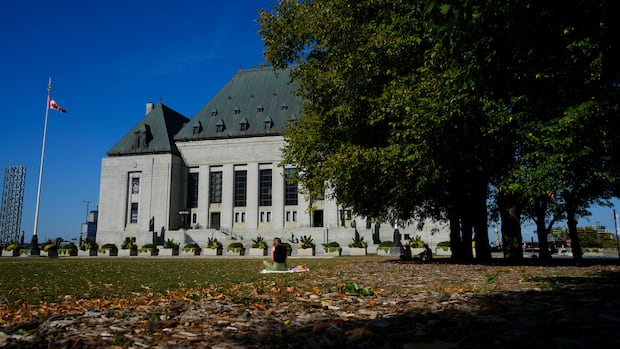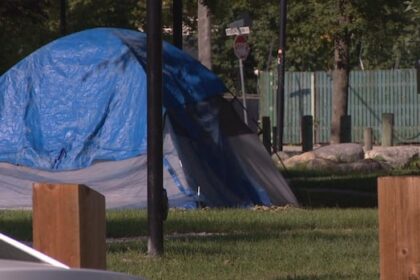PoliticsIn a divisive decision, the country’s top court struck down the mandatory minimum jail sentences for accessing or possessing child pornography — deeming them unconstitutional. Decision affirms ruling of the Quebec Court of AppealCatharine Tunney · CBC News · Posted: Oct 31, 2025 11:47 AM EDT | Last Updated: 1 hour agoListen to this articleEstimated 4 minutesThe Supreme Court’s 5-4 decision rules that the one-year mandatory minimum sentence is unconstitutional. (Sean Kilpatrick/The Canadian Press)In a divisive decision that’s already being lambasted as “disgusting” and “outrageous,” the country’s top court struck down mandatory minimum jail sentences for accessing or possessing child pornography — deeming them unconstitutional. Friday’s ruling not only split the bench 5-4, but has received swift backlash and mounting calls for the federal government to step in. The Supreme Court of Canada was asked to weigh in on an appeal from Quebec involving two separate cases involving child pornography offences. In both cases, the men pleaded guilty to having hundreds of images of children, some as young as three, being abused. Both of them challenged the mandatory minimum sentences for their crimes arguing they were unconstitutional because they could lead to grossly disproportionate punishment.The sentencing judge in Quebec decided in their favour and the Crown appealed all the way up to the Supreme Court. The question before the Supreme Court was whether the one-year prison sentence for accessing and possesing child pornography set out in the Criminal Code violated the Charter of Rights and Freedoms, which protects against cruel and unusual punishment.The top court was asked to weigh in exclusively on the constitutionality of the mandatory minimum sentences and not whether the sentences imposed on the two men were appropriate. The majority narrowly affirmed a ruling of the Quebec Court of Appeal.Writing for the majority, Justice Mary Moreau argued there’s a range of circumstances that could lead to convictions of possession or access to child pornography.“They capture both the well‑organized offender who, over the years, has accumulated thousands of files showing prepubescent victims, and the young 18‑year‑old offender who, one day, keeps and views a file showing a 17‑year‑old victim that was sent to the offender without them having requested it,” the decision read. Moreau wrote that “in the age of digital communication” that last scenario “is not uncommon.” ‘Disgusting’ decision: Conservative PartyWriting for the dissenting voices, justices Richard Wagner and Suzanne Côté said they would have allowed the appeal. “The censure of society and the law must be reflected consistently and rigorously in the sentences imposed on offenders who are guilty of sexual offences against minors,” they wrote.“Through the imposition of more severe sentences, the justice system expresses society’s deep and rightful indignation.” Conservatives were swift to condemn the majority’s decision.In a statement, the federal party called the decision a disgusting and cruel insult to victims.“Any normal person who reads this decision would be disgusted, and it is outrageous that child predators might walk free with less than a year in prison,” wrote Conservative MP Larry Brock, the party’s justice critic. Ontario Premier Doug Ford called on the govenemnt to invoke Section 33 of the Charter — known as the notwithstanding clause — which allows premiers or prime ministers to override certain Charter rights for a five-year period.”These people are predators. Disgusting scumbags who prey on children belong behind bars for the rest of their miserable lives,” he said on social media. “The notwithstanding clause was designed to protect the will of the people.”Calling the majority decision “outrageous,” Alberta Premier Danielle Smith also called for the notwithstanding clause to be used.“The possession of child pornography is a heinous crime, and even a one-year minimum sentence is already far too lenient,” she wrote.Saskatchewan Premier Scott Moe also weighed in writing online, “if you ever wonder why I am so adamant that elected legislators, not unelected judges, should be the ones making the laws read [this] story.”A spokesperson for Attorney General Sean Fraser’s office said they are reviewing the ruling’s implications “carefully.”“Crimes that exploit or abuse children are among the most serious and reprehensible in our society,” said the spokesperson, Lola Dandybaeva, in an emailed statement. “Plain and simple: child abusers should face the toughest penalties Canadian law allows.”ABOUT THE AUTHORCatharine Tunney is a reporter with CBC’s Parliament Hill bureau, where she covers national security and the RCMP. She worked previously for CBC in Nova Scotia. You can reach her at catharine.tunney@cbc.ca With files from The Canadian Press
Sask. premier among critics of Supreme Court ruling striking down minimum sentences for child pornography











